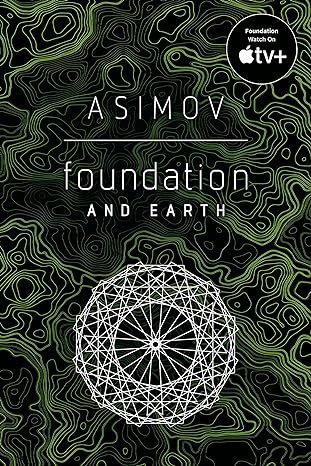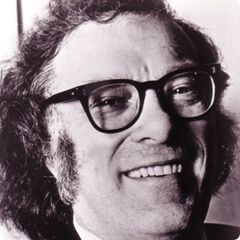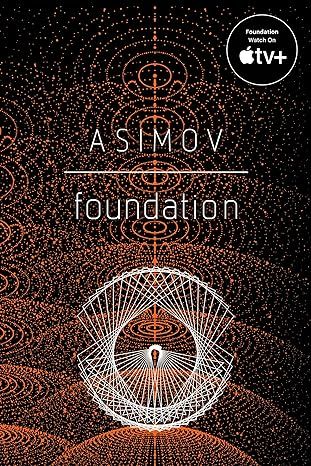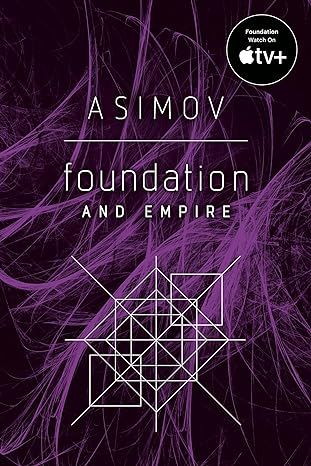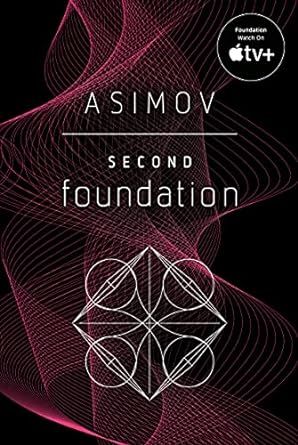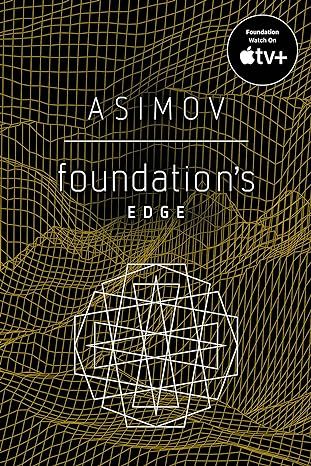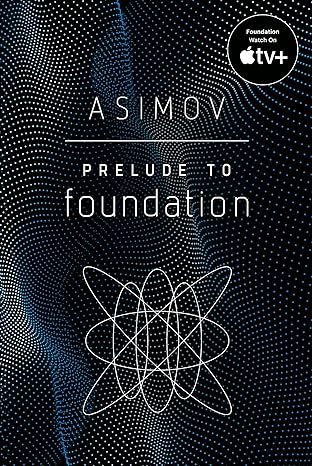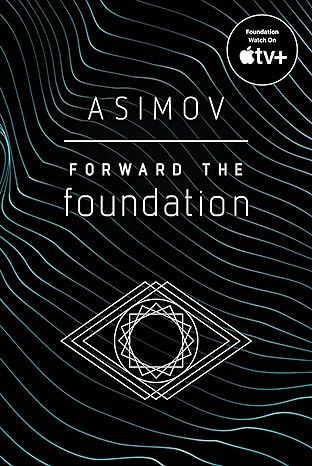Foundation and Earth
4.5
-
6,359 ratings
The fifth novel in Isaac Asimov’s classic science-fiction masterpiece, the Foundation series
THE EPIC SAGA THAT INSPIRED THE APPLE TV+ SERIES FOUNDATION
Golan Trevize, former Councilman of the First Foundation, has chosen the future, and it is Gaia. A superorganism, Gaia is a holistic planet with a common consciousness so intensely united that every dewdrop, every pebble, every being, can speak for all—and feel for all. It is a realm in which privacy is not only undesirable, it is incomprehensible.
But is it the right choice for the destiny of mankind? While Trevize feels it is, that is not enough. He must know.
Trevize believes the answer lies at the site of humanity’s roots: fabled Earth . . . if it still exists. For no one is sure where the planet of Gaia’s first settlers is to be found in the immense wilderness of the Galaxy. Nor can anyone explain why no record of Earth has been preserved, no mention of it made anywhere in Gaia’s vast world-memory. It is an enigma Trevize is determined to resolve, and a quest he is determined to undertake, at any cost.
Kindle
$8.99
Available instantly
Audiobook
$0.00
with membership trial
Library Binding
$25.43
Paperback
$11.57
Ships from
Amazon.com
Payment
Secure transaction
ISBN-10
9780008117535
ISBN-13
978-0008117535
Print length
423 pages
Language
English
Publisher
Del Rey; GARDNERS VI BOOKS AMS006
Publication date
December 31, 2015
Dimensions
5.12 x 1.16 x 7.76 inches
Item weight
11.6 ounces
Frequently bought together
Product details
ASIN :
0008117535
File size :
14767 KB
Text-to-speech :
Enabled
Screen reader :
Supported
Enhanced typesetting :
Enabled
X-Ray :
Enabled
Word wise :
Enabled
Sample
1
THE SEARCH BEGINS
1
"Why did I do it?" asked Golan Trevize.
It wasn't a new question. Since he had arrived at Gaia, he had asked it of himself frequently. He would wake up from a sound sleep in the pleasant coolness of the night and find the question sounding noiselessly in his mind, like a tiny drumbeat: Why did I do it? Why did I do it?
Now, though, for the first time, he managed to ask it of Dom, the ancient of Gaia.
Dom was well aware of Trevize's tension for he could sense the fabric of the Councilman's mind. He did not respond to it. Gaia must in no way ever touch Trevize's mind, and the best way of remaining immune to the temptation was to painstakingly ignore what he sensed.
"Do what, Trev?" he asked. He found it difficult to use more than one syllable in addressing a person, and it didn't matter. Trevize was growing somewhat used to that.
"The decision I made," said Trevize. "Choosing Gaia as the future."
"You were right to do so," said Dom, seated, his aged deep-set eyes looking earnestly up at the man of the Foundation, who was standing.
"You say I am right," said Trevize impatiently.
"I/we/Gaia know you are. That's your worth to us. You have the capacity for making the right decision on incomplete data, and you have made the decision. You chose Gaia! You rejected the anarchy of a Galactic Empire built on the technology of the First Foundation, as well as the anarchy of a Galactic Empire built on the mentalics of the Second Foundation. You decided that neither could be long stable. So you chose Gaia."
"Yes," said Trevize. "Exactly! I chose Gaia, a superorganism; a whole planet with a mind and personality in common, so that one has to say 'I/we/Gaia' as an invented pronoun to express the inexpressible." He paced the floor restlessly. "And it will become eventually Galaxia, a super-superorganism embracing all the swarm of the Milky Way."
He stopped, turned almost savagely on Dom, and said, "I feel I'm right, as you feel it, but you want the coming of Galaxia, and so are satisfied with the decision. There's something in me, however, that doesn't want it, and for that reason I'm not satisfied to accept the rightness so easily. I want to know why I made the decision, I want to weigh and judge the rightness and be satisfied with it. Merely feeling right isn't enough. How can I know I am right? What is the device that makes me right?"
"I/we/Gaia do not know how it is that you come to the right decision. Is it important to know that as long as we have the decision?"
"You speak for the whole planet, do you? For the common consciousness of every dewdrop, of every pebble, of even the liquid central core of the planet?"
"I do, and so can any portion of the planet in which the intensity of the common consciousness is great enough."
"And is all this common consciousness satisfied to use me as a black box? Since the black box works, is it unimportant to know what is inside? --That doesn't suit me. I don't enjoy being a black box. I want to know what's inside. I want to know how and why I chose Gaia and Galaxia as the future, so that I can rest and be at peace."
"But why do you dislike or distrust your decision so?"
Trevize drew a deep breath and said slowly, in a low and forceful voice, "Because I don't want to be part of a superorganism. I don't want to be a dispensable part to be done away with whenever the superorganism judges that doing away would be for the good of the whole."
Dom looked at Trevize thoughtfully. "Do you want to change your decision, then, Trev? You can, you know."
"I long to change the decision, but I can't do that merely because I dislike it. To do something now, I have to know whether the decision is wrong or right. It's not enough merely to feel it's right."
"If you feel you are right, you are right." Always that slow, gentle voice that somehow made Trevize feel wilder by its very contrast with his own inner turmoil.
Then Trevize said, in half a whisper, breaking out of the insoluble oscillation between feeling and knowing, "I must find Earth."
"Because it has something to do with this passionate need of yours to know?"
"Because it is another problem that troubles me unbearably and because I feel there is a connection between the two. Am I not a black box? I feel there is a connection. Isn't that enough to make you accept it as a fact?"
"Perhaps," said Dom, with equanimity.
"Granted it is now thousands of years--twenty thousand perhaps--since the people of the Galaxy have concerned themselves with Earth, how is it possible that we have all forgotten our planet of origin?"
"Twenty thousand years is a longer time than you realize. There are many aspects of the early Empire we know little of; many legends that are almost surely fictitious but that we keep repeating, and even believing, because of lack of anything to substitute. And Earth is older than the Empire."
"But surely there are some records. My good friend, Pelorat, collects myths and legends of early Earth; anything he can scrape up from any source. It is his profession and, more important, his hobby. Those myths and legends are all there are. There are no actual records, no documents."
"Documents twenty thousand years old? Things decay, perish, are destroyed through inefficiency or war."
"But there should be records of the records; copies, copies of the copies, and copies of the copies of the copies; useful material much younger than twenty millennia. They have been removed. The Galactic Library at Trantor must have had documents concerning Earth. Those documents are referred to in known historical records, but the documents no longer exist in the Galactic Library. The references to them may exist, but any quotations from them do not exist."
"Remember that Trantor was sacked a few centuries ago."
"The Library was left untouched. It was protected by the personnel of the Second Foundation. And it was those personnel who recently discovered that material related to Earth no longer exists. The material was deliberately removed in recent times. Why?" Trevize ceased his pacing and looked intently at Dom. "If I find Earth, I will find out what it is hiding--"
"Hiding?"
"Hiding or being hidden. Once I find that out, I have the feeling I will know why I have chosen Gaia and Galaxia over our individuality. Then, I presume, I will know, not feel, that I am correct, and if I am correct"--he lifted his shoulders hopelessly--"then so be it."
"If you feel that is so," said Dom, "and if you feel you must hunt for Earth, then, of course, we will help you do as much as we can. That help, however, is limited. For instance, I/we/Gaia do not know where Earth may be located among the immense wilderness of worlds that make up the Galaxy."
"Even so," said Trevize, "I must search. --Even if the endless powdering of stars in the Galaxy makes the quest seem hopeless, and even if I must do it alone."
Read more
About the authors
Isaac Asimov
Isaac Asimov was an American author and professor of biochemistry at Boston University, best known for his works of science fiction and for his popular science books. Asimov was prolific and wrote or edited more than 500 books and an estimated 90,000 letters and postcards. His books have been published in 9 of the 10 major categories of the Dewey Decimal Classification.
Asimov wrote hard science fiction and, along with Robert A. Heinlein and Arthur C. Clarke, he was considered one of the "Big Three" science fiction writers during his lifetime. Asimov's most famous work is the Foundation Series; his other major series are the Galactic Empire series and the Robot series. The Galactic Empire novels are explicitly set in earlier history of the same fictional universe as the Foundation series. Later, beginning with Foundation's Edge, he linked this distant future to the Robot and Spacer stories, creating a unified "future history" for his stories much like those pioneered by Robert A. Heinlein and previously produced by Cordwainer Smith and Poul Anderson. He wrote hundreds of short stories, including the social science fiction "Nightfall", which in 1964 was voted by the Science Fiction Writers of America the best short science fiction story of all time. Asimov wrote the Lucky Starr series of juvenile science-fiction novels using the pen name Paul French.
Read more
Reviews
Customer reviews
4.5 out of 5
6,359 global ratings
Jake A.
5
Another great book!
Reviewed in the United States on December 31, 2023
Verified Purchase
I’ve enjoyed the Foundation saga and this is a great ending to Books 4 and 5. Ties into other Asimov books as well.
JimE
5
Foundation and Earth. Thought provoking and satisfying.
Reviewed in the United States on January 4, 2017
Verified Purchase
Science fiction literature has been part of my reading since my early teens. My earliest readings contained, by today's standards, relatively tame sexual interludes and of course assured my continued reading. Sexuality in this example of Asimov's writing is really quite tame, but would have kept the 14 year old me entranced. The adult me is impressed with the mature sexual attitudes taken in this story. Beyond all that Asimov provokes mature conjecture about humanity and profound philosophical conjectures about broad questions, not only of human governance, but also human interactions across different worlds and cultures. This book like many of his benefits from Dr. Asimov's excellent education and his being present at the cutting edges of physics and science during some of its most profound advances. He refers to things like the uncertainty principle in an off hand way that does require a bit from the reader. In summary, Dr. Asimov gives us very entertaining stories interspersed with thought provoking philosophy and sophisticated scientific references. It's a very satisfying book to read.
Read more
Jane Aire
5
Love this series.
Reviewed in the United States on October 6, 2023
Verified Purchase
It’s a series that can be read over and over and never dull. The writing and storytelling are captivating and unlike anything else.
Top Isaac Asimov titles
View allBest sellers
View all
The Tuscan Child
4.2
-
100,022
$8.39

The Thursday Murder Club: A Novel (A Thursday Murder Club Mystery)
4.3
-
155,575
$6.33

Sapiens: A Brief History of Humankind
4.6
-
140,302
$13.49

The Butterfly Garden (The Collector, 1)
4.3
-
88,556
$9.59

Things We Hide from the Light (Knockemout Series, 2)
4.4
-
94,890
$11.66

The Last Thing He Told Me: A Novel
4.3
-
154,085
$2.99

The Perfect Marriage: A Completely Gripping Psychological Suspense
4.3
-
143,196
$9.47

The Coworker
4.1
-
80,003
$13.48

First Lie Wins: A Novel (Random House Large Print)
4.3
-
54,062
$14.99

Mile High (Windy City Series Book 1)
4.4
-
59,745
$16.19

Layla
4.2
-
107,613
$8.99

The Locked Door
4.4
-
94,673
$8.53
